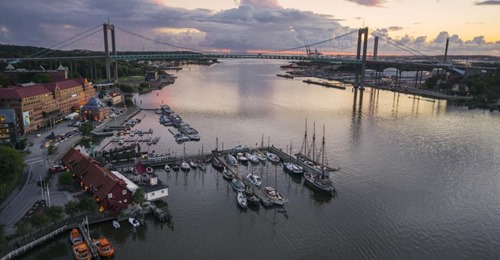Fossil-free energy takes off in Gothenburg
/2017_08_24_Fossil_free_energy_district_Johanne.jpg)
Johanneberg Science Park, an IASP member from Gothenburg, Sweden, is contributing expertise and knowledge to the city’s Fossil-free Energy Districts project.
The Fossil-free Energy Districts project is an innovative effort to decrease the use of energy and the dependence on fossil fuel in a built environment. A unique local marketplace for electricity, district heating and cooling is being developed by Johanneberg and seven other local partners, who hope to make FED attractive for other European cities as well.
One of the other partners is Göteborg Energi, a utility company that provides common district heating and distributes electric energy. With FED they want to explore renewable production and their role in a changed energy landscape.
Energy efficiency has been an important goal at Göteborg Energi for many years, and the FED system is a big step in the right direction. It operates on the basis of trading excess energy through a digitalised automated system. Its flexibility allows users to decide when to buy energy, and switch between different energy carriers depending on production and price. This means that an overproduction of renewable electric energy could contribute to the district heating system.
The FED-project aims to deliver a grid-connected local energy system with demand and supply in balance, integrating electricity, heating and cooling, and a local energy market and trading system functioning in symbiosis with the existing energy market. It will see important environmental improvements, including decreased energy peaks and a local energy production that is 100% fossil-free.
There are currently three energy carriers traded on the local energy marketplace, representing electricity, district heating, and cooling, with 15,000 end users taking advantage of a cost-effective local energy trading system which especially benefit poorer citizens.
To find out more about the work of Johanneberg Science Park, please visit www.johannebergsciencepark.com.
/)


/canvascolor(0xffffffff)/MemberLogo-54503-6263.jpg)
/canvascolor(0xffffffff)/2018_08_14_Qatar_Qatar_Science_Park.jpg)
/canvascolor(0xffffffff)/MemberLogo-5660-6092.jpg)
/canvascolor(0xffffffff)/WhatsApp_Image_2020-03-12_at_10.51.40.jpg)
/canvascolor(0xffffffff)/MemberLogo-69601-343301.jpg)
/canvascolor(0xffffffff)/logo_21.png)
/canvascolor(0xffffffff)/2017_10_26_Portugal_Tecmaia.png)
/canvascolor(0xffffffff)/IT_park-01_1.png)
/canvascolor(0xffffffff)/MemberLogo-5823-6309.png)
/canvascolor(0xffffffff)/MemberLogo-5761-6218.png)
/canvascolor(0xffffffff)/MemberLogo-5652-6081.jpg)
/canvascolor(0xffffffff)/2024_03_01_Brazil_PCT_Sao_Jose_Dos_Campos.jpg)
/canvascolor(0xffffffff)/2017_10_31_Spain_Fundacion_Comunitat_Valencian.jpg)
/canvascolor(0xffffffff)/UBT1_1.png)
/canvascolor(0xffffffff)/PCT_VILLA_CLARA.png)
/canvascolor(0xffffffff)/buildings2.png)
/canvascolor(0xffffffff)/MemberLogo-5751-6208.jpg)
/canvascolor(0xffffffff)/2017_11_15_Slovekia_CEPIT.jpg)
/canvascolor(0xffffffff)/KENNISPARK-TWENTE_FC-LOGO-1-800x220_1.png)
/canvascolor(0xffffffff)/2023_10_09_Brazil_PCT_UNICAMP.jpg)
/canvascolor(0xffffffff)/rs_ystp-logo-en-high-02.png)
/canvascolor(0xffffffff)/2021_08_20_China_Baixia_High-Tech_Zone.jpg)
/canvascolor(0xffffffff)/MemberLogo-56301-60901.jpg)
/canvascolor(0xffffffff)/2017_06_08_Panama_Ciudad_del_saber.png)
/canvascolor(0xffffffff)/2017_11_10_Sweden_IDEON_Science_Park.jpg)
